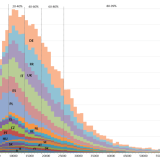
Velfungerende og rummelige arbejdsmarkeder
Velfungerende arbejdsmarkeder er en forudsætning for en fuld udnyttelse af økonomiens jobskabelsespotentiale, efterhånden som den kommer på fode efter den finansielle og økonomiske krise. Krisen har haft meget forskellige konsekvenser for arbejdsmarkedet i EU-medlemsstaterne, og nogle grupper, f.eks. unge og lavtuddannede, blev særlig hårdt ramt. De hastige igangværende strukturelle ændringer udgør også nye udfordringer med hensyn til mulig arbejdskraftmangel og misforhold mellem udbudte og efterspurgte færdigheder i forskellige sektorer og regioner.
EU's vigtigste redskab til at fremme beskæftigelse og social inklusion er Den Europæiske Socialfond – ved at hjælpe folk i arbejde og integrere dårligt stillede grupper i samfundet og sikre mere retfærdige livsmuligheder for alle. Der er også omfattende europæisk lovgivning, som regulerer arbejdstagernes rettigheder på arbejdsmarkedet. Endvidere lancerede Europa-Kommissionen i april 2017 den europæiske søjle for sociale rettigheder. Søjlen bygger på og supplerer EU's social- og beskæftigelsespolitik med henblik på at være retningsvisende for politikken på en række områder, der er afgørende for velfungerende og fair arbejdsmarkeder og velfærdssystemer.
- Europa-Kommissionen: Den Europæiske Socialfond
- Europa-Kommissionen: Europæisk søjle for sociale rettigheder




























